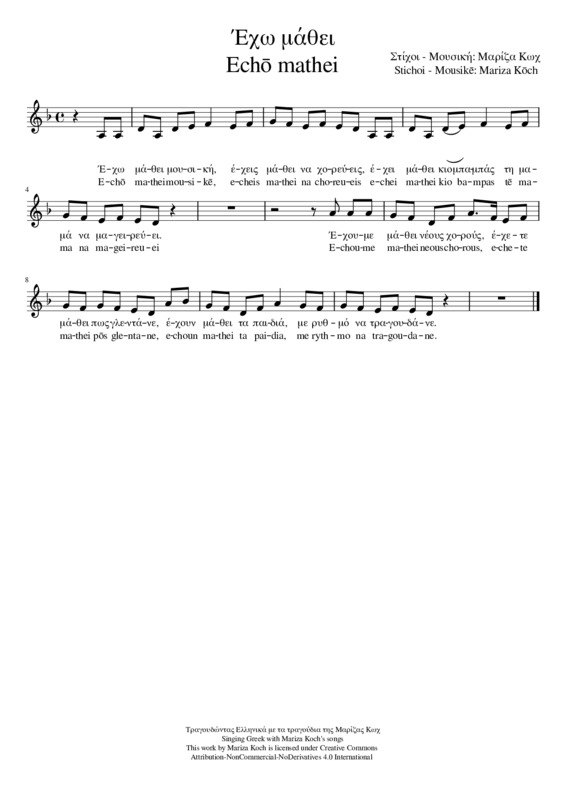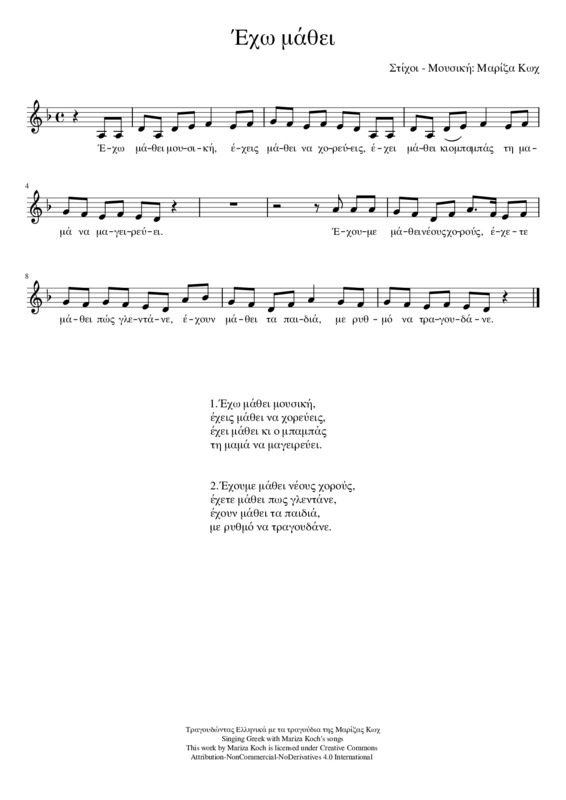
Echō mathei

Echō mathei
Pronunciation
Articulation of the diphthong /ευ/ (/eu/=eu and eph) as "eu" [χορεύει (choreuei, he/she/it dances), μαγειρεύει (mageireuei, he/she/it cooks)] in contrast with its phonation as "eph" [Ευσταθία (Ephstathia, Eustace), ευτυχία (ephtychia, happiness) ευχαρίστηση (ephcharistēsē, pleasure)].
Find Greek words beginning with or containing the diphthong /eu/ pronounced in both ways so that the pupils practice its use.
Find Greek words beginning with or containing the diphthong /eu/ pronounced in both ways so that the pupils practice its use.
Speech Comprehension and Production
Briefly discuss with the pupils and use Present Perfect tense in the conversation: i.e. έχω μάθει μουσική (echō mathei mousikē, I have learnt music), πού έχεις μάθει να χορεύεις; (pou echeis mathei na choreueis?, where have you been taught dancing?) έχετε μάθει να μαγειρεύετε; (echete mathei na mageireuete? have you learnt cooking?) ποια φαγητά έχετε μάθει να μαγειρεύετε; (poia phagēta echete mathei na mageireuete, which dishes have you learnt to cook?) etc.
The pupils mention what they have learnt all together as in group, and what they have learnt on their own [i.e. Έχουμε μάθει ελληνικές λέξεις (Echoume mathei ellēnikes lexeis, we have learnt Greek words), έχω μάθει να χορεύω τσάμικο, (echō mathei na choreuō tsamiko, I have learnt dancing tsamiko), etc.].
The pupils mention what they have learnt all together as in group, and what they have learnt on their own [i.e. Έχουμε μάθει ελληνικές λέξεις (Echoume mathei ellēnikes lexeis, we have learnt Greek words), έχω μάθει να χορεύω τσάμικο, (echō mathei na choreuō tsamiko, I have learnt dancing tsamiko), etc.].
Music Activities
Accompany the song with ostinato on melodic and rhythmic percussion.
Approach the concept of the rest and familiarize with the musical symbols of the whole, half, quarter and eighth rest.
Play singing games while moving with alternations of sounds and rests. The children proceed rhythmically or stop respectively.
Approach the concept of the rest and familiarize with the musical symbols of the whole, half, quarter and eighth rest.
Play singing games while moving with alternations of sounds and rests. The children proceed rhythmically or stop respectively.
Cross-thematic Connections - Greek Culture
Interdisciplinary concept: culture (celebrations and ways of entertainment in modern Greek society, especially between family members).
Comment on the forms of entertainment available on the internet.
Occasions for entertainment, dancing and singing in Greek society: family celebrations, festivals, wedding parties, christening parties, religious celebrations, birthdays. etc.
Comment on the forms of entertainment available on the internet.
Occasions for entertainment, dancing and singing in Greek society: family celebrations, festivals, wedding parties, christening parties, religious celebrations, birthdays. etc.
Age level
7-11 years old
Language level
Beginner
Family
Music
Me tē Mariza tragoudō ellēnika mathainō





